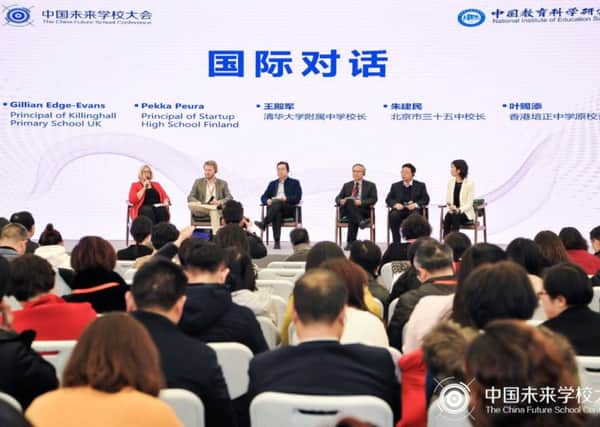'˜Golden age' as China syndrome now spreads to primary schools '˜golden


The Confederation of British Industry has urged UK faculties to deepen their ties with China in the light of its increasing significance as an economic and research partner. A number of universities in the region, including those in York and Sheffield, have established partnerships with institutions in the far east.
But in Bradford, the charge is being led by a primary headteacher. Gill Edge, from Killinghall School, east of the city centre, was invited by the Chinese National Institute of Education Sciences to speak at their fourth China Future Schools Conference.
Advertisement
Hide AdAdvertisement
Hide AdThe event was attended by more than 1,000 delegates from across China and by other international speakers attending as members of the Future School Laboratory, a body established by the Chinese government to improve its education systems.
Ms Edge said: “There are currently no established teaching standards in China. I was able to explain how teaching standards are used nationally in the UK and how supporting and challenging teachers through appraisal has improved the quality of teaching and learning in our schools.”
Killinghall Primary is rated “good” by Ofsted but the city as a whole is one of the lowest performing in the country for primary age pupils achieving the expected standards in key subjects.
Ms Edge said she had been proud to represent the city, and added: “I feel we are often not recognised for the excellent work that goes on in our schools across the district”.
Advertisement
Hide AdAdvertisement
Hide AdForging better links with China has become a priority for institutions across the region. Last month, Sheffield University’s president and vice-chancellor, Prof Sir Keith Burnett, addressed the country’s vice-Premier, Liu Yandong, on an official visit to London.
He said: “I want to share our desire to work closely with scholars in China who are working with us on the crucial challenges of the future – sustainable cities, economic prosperity, food security and health.”
Sheffield University is home to 3,419 Chinese students and there are 12,368 Sheffield graduates in China. In 2011 the institution forged a partnership with Nanjing Tech University which led to the creation of a joint degree programme in chemistry, in which Chinese students are taught in English by Sheffield academics for three years before coming to Yorkshire for their final year.
The University of York launched a foundation in 2010 to promote cultural exchange between the two countries. It provides History of Art scholarships for MA students, and the funding of staff mobility programmes in arts and humanities.
Advertisement
Hide AdAdvertisement
Hide AdSix Yorkshire universities including Bradford are part of a northern consortium which operates the Sino British College in Shanghai, in partnership with a local institution.
The CBI has said the post-Brexit era could be a “golden age” for UK-China relations. Guy Dru-Drury, head of the CBI’s China office, said: “With higher education a top priority for China, the vibrant range of existing research partnerships, high-quality teaching and business incubators demonstrate how both nations can benefit from a closer working relationship.”